Exercises (2302)
Backflip IV
Parkour
Partner work

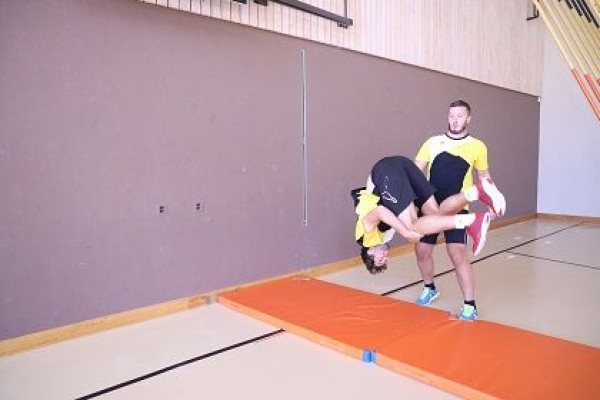
The partner places the hand of the arm further away on the back of the jumper's neck and the other hand on the lower back. The hands accompany the jumper throughout the jump until they reach a safe standing position. Run towards the wall with momentum, run up the wall to shoulder height with one or two feet and push off, rest your head on the back of your neck and throw your legs in the direction of rotation, turn and land on both legs.
Variant:
Hook a vaulting box top diagonally into the wall bars as an aid and walk up it.
1 wall
2-3 soft mats (small) ► Indoor version
Variation of the exercise:
1 wall bars
1 vaulting box
Badminton
Games / Tournament
Game idea:
Two parties try to score a direct point by skilfully hitting the shuttle or to force a mistake by the opposing party.
Scoring:
A point is scored if the shuttle lands in the opponent's court or if the opposing party cannot return the shuttle in accordance with the rules.
Court:
Badminton court, net height 1.55m.
- Singles: inside sideline; back baseline.
- Doubles: outside sideline; back baseline.
- On serve, the court is bordered by the front service line.
Number of participants:
1 against 1 (singles), 2 against 2 (doubles)
Rules of the game:
Each party can score regardless of the right to serve. The player who won the previous point has the right to serve. The serving player must stand within their own service sector and play the shuttle diagonally into the opponent's service sector. If your own score is even, the serve is made from your own right-hand sector; if your own score is odd, the serve is made from the left-hand sector. The serve is served below the waist and the shuttle may touch the net when serving (no repetition).
Doubles:
The right to serve changes to the opponent after a fault. If the right to serve changes, the person serving also changes within the team.
Only one serve per party is allowed. It is considered a fault if the shuttle does not cross the net, touches the wall, ceiling or floor outside the court or if a party or a racket touches the net.
A set goes to 21 points. To win, there must be at least a 2-point difference (i.e. the game continues until one party has a 2-point lead) and it is played to two winning sets.
Badminton: Conscious stroke execution
Forms of play / exercises
Groups of 2
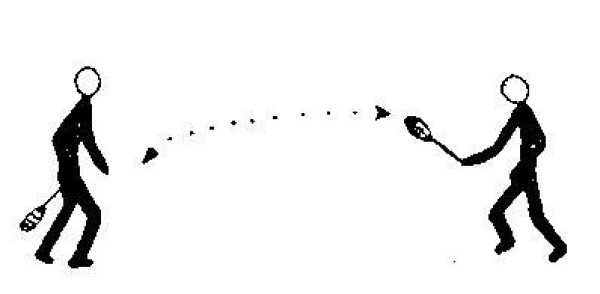
Passing game in teams of two; during the passes, the partner is asked for the type of shot, but before the shuttle goes over the net (e.g. forehand, backhand, overhead, hand change or rotation on its own axis)
Per participant:
1 badminton racket
Per group:
1 shuttle
Badminton: Accuracy
Forms of play / exercises
Groups of 2

Passing game in teams of two; both players stand so that they have little freedom of movement (e.g. on a long bench, a vaulting box or in a hoop)
Variant:
Only one player has limited freedom of movement.
Per participant:
1 badminton racket
Per group:
1 shuttle
2 long benches, vaulting box or tyre
Badminton: Skill
Forms of play / exercises
Groups of 2

Passing game in teams of two; the shuttle should be caught and stopped by the player every third or fifth touch of the ball.
Per participant:
1 badminton racket
Per group:
1 shuttle
Badminton: Controlled hitting and stopping
Forms of play / exercises
Groups of 2
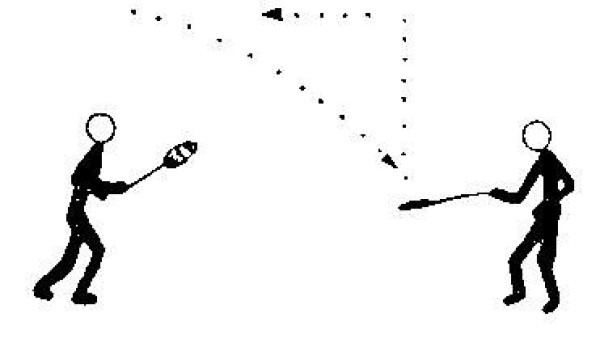
Passing game in teams of two; before the shuttle is hit back, however, it is played vertically upwards and only then hit back again.
Per participant:
1 badminton racket
Per group:
1 shuttle
Badminton: Circle game
Forms of play / exercises
Group work
6-8 participants form a circle. The game is played with a shuttle, which should stay in the air as long as possible.
Variant:
Multiple shuttles.
Per participant:
1 badminton racket
Per group:
1 shuttle
Badminton: Marathonspiel
Forms of play / exercises
Groups of 2

Two players pass the shuttle to each other as often as possible in a given time and count the shuttle changes. All pairs are the same distance apart. The pair with the highest number of shuttle changes wins the game.
Per participant:
1 badminton racket
Per group:
1 shuttle
Badminton: Round robin
Forms of play / exercises
Group work

4-10 players play on each pitch, evenly distributed over both halves of the pitch. The foremost players on both sides are in the field and pass the shuttle to each other. The remaining players wait in single file behind the playing field until it is their turn. After each stroke, the respective player runs to the opposite side, lines up at the back and waits for his next stroke. The player at the front of the column becomes the new batter. If a player makes a mistake (hit out or ball falls to the ground in their own court), they are eliminated from the game. The last 2 players play a final game to 3 points.
Variant:
Ejected players have the chance to return to the game by being eliminated by the player who threw them out (i.e. last touch of the ball before the error).
Per participant:
1 badminton racket
Per court:
1 shuttle
Badminton: Change hands
Forms of play / exercises
Groups of 2
Passing game in teams of two; change of hands after each shot. Who makes fewer mistakes?
Per participant:
1 badminton racket
Per group:
1 shuttle
Badminton: Game
Forms of play / exercises
Group work

Single (group of 2) or double game (group of 4) for a certain number of points (e.g. 10). If the group size is uneven (e.g. 3 participants), one player enjoys a break, whereby the duration of the game is reduced (e.g. 7 points) so that waiting times are shortened.
Additional task Strengthening:
After each game, the loser completes a strength exercise: 5x push-ups plus stretch jump (burpee)
1 badminton net
2 badminton support poles
2-4 badminton rackets
1 badminton shuttle
Badminton: Relay race
Forms of play / exercises
Group work
Pendulum relay with several teams (participants of the teams are evenly distributed on markers approx. 20 metres apart). Each team has a racket and a shuttle. The first runner from each team must balance the shuttle with the racket to the other side while running and then hand the racket and shuttle to the next runner. If the shuttle falls down, it must be picked up and placed back on the racket. Each player completes two runs (i.e. the players are in the same position at the end as at the beginning).
Variant:
The players must hit the shuttle at least 10 times in the air during the race.
Per participant:
1 badminton racket
Per group:
1 shuttle
Badminton: Techniktraining
Forms of play / exercises
Groups of 2


Explain the stroke terms clear, lob, drop, net drop, drive and smash on the flipchart (see image 1/2).
Two players stand opposite each other on either side of the net and perform various stroke exercises:
- Clear - Clear
- Drop - Underhand Clear
- Net Drop - Net Drop (play exclusively in the court in front of the service line)
- Drive - Drive
- Clear - Smash
Handling position:
- Rush grip (frying pan) for beginners
- Forhand / backhand grip offers more options
Per participant:
1 badminton racket
Per group:
1 badminton shuttle
1 flipchart (stroke types)
Badminton: Exercises for beginners
Forms of play / exercises
Individual work

Shuttle juggling in various positions (smooth transitions):
- standing
- walking
- sitting
- on your stomach
- on your back
- running
- walking backwards, etc.
Per participant:
1 badminton racket and 1 shuttle
Badminton: Changeover
Forms of play / exercises
Groups of 2
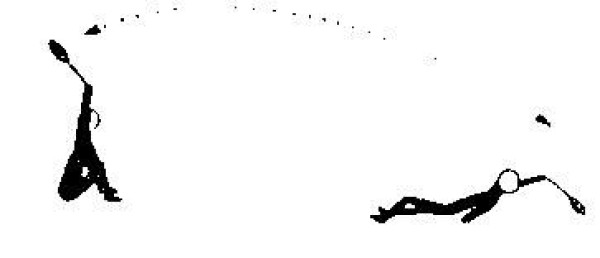
Passing game in teams of two; the players sit opposite each other and pass the shuttle to each other. From this position, the players take it in turns to lie on their backs without interrupting the rally.
Per participant:
1 badminton racket
Per group:
1 shuttle
Balance artist
Coordination exercises
Individual work

The participant tries to maintain balance on a balance board (feet parallel or orthogonal to the roller). The exercise can be made more difficult by doing squats or juggling balls at the same time. Advanced users can also stand on the balance board on one leg. For beginners, a friend can provide assistance or you can position yourself in front of a wall that you can support yourself against.
► Balance ability
1 balance board
3 tennis balls
Balance artist
Coordination exercises
Individual work

Stand on the narrow side of the long bench on one leg and perform half and full turns without falling off the bench. After a few attempts, change the standing leg.
► Balance ability
1 Longbank
Balance artist
Coordination exercises
Individual work
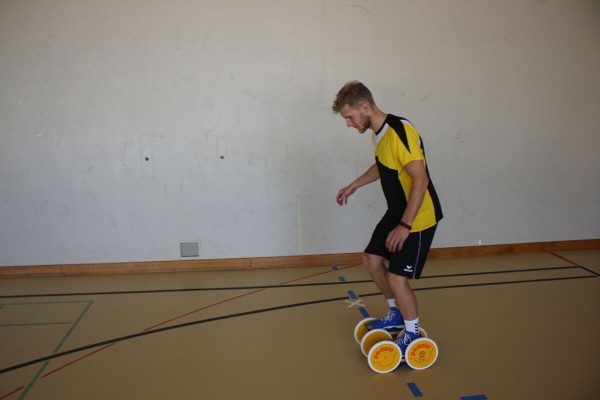
Running a certain distance standing on a running board with wheels.
Difficulty:
Running backwards.
Variant:
Race between group members over a specified distance. On contact with the ground, the respective participant must move back by 2 metres.
► Balance ability
1 footboard with wheels
Balance artist
Coordination exercises
Individual work

Sit on the exercise ball, raise your arms and legs slightly and keep your balance (floating position).
Variant:
Take a kneeling or even standing position on the exercise ball.
►Balance ability
1 exercise ball
Balance artist
Coordination exercises
Individual work

The participant positions themselves in front of the long bench, fixes a point on the ceiling or floor and quickly rotates around their own axis 5-10 times before balancing over the long bench immediately afterwards.
► Orientation skills, balance skills
1 Longbank
Balancieren
Parkour
Partner work
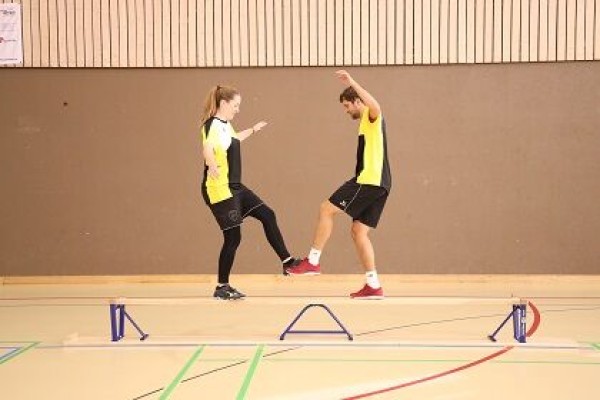

Two participants stand on one leg on the narrow side of a long bench and face each other head-on (stand on a wall, ground line or other elevation ►outdoor version), pressing the inside of the foot of the free leg (also possible with the outside edge of the foot) against the foot of the other person, then trying to push their partner off the bench without losing their balance. Switch legs from time to time.
1 long bench
Indoor post setup:
Narrow side of the long bench points upwards.
Outdoor:
Narrow wall, ground line or other elevation.
Balancieren
Parkour
Individual work
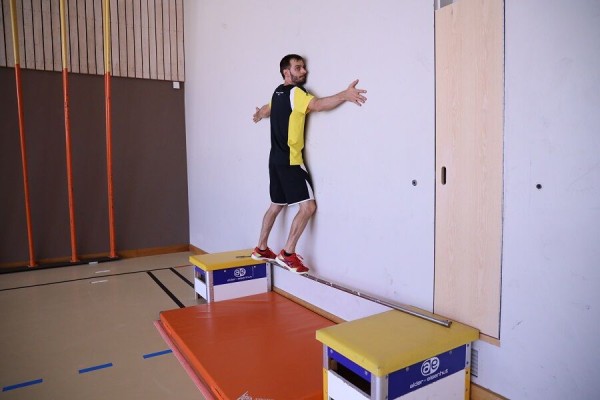
Balance over the horizontal bar from one side of the vaulting box to the other
.2 vaulting boxes
1 horizontal bar
1 soft mat (small)
Post structure:
Place two vaulting boxes (2 elements each incl. top section) on a wall approx. 1.5m apart, place a horizontal bar over the two top sections.
Balancieren
Parkour
Individual work

Balance over the horizontal bars from box to box top.
Variations:
Integrate jumps;
Include 180 and 360 degree turns.
outdoor:
Balance on a narrow ledge and incorporate jumps and 180 or 360 degree turns.
3 vaulting box (upper parts)
2 horizontal bars
Post structure indoor:
Three vaulting box upper parts are placed on the floor and connected with horizontal bars.
outdoor:
a narrow bar/raiser.
Balancieren
Parkour
Individual work
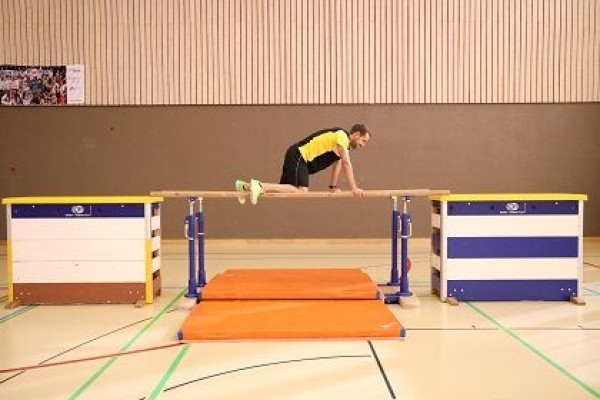
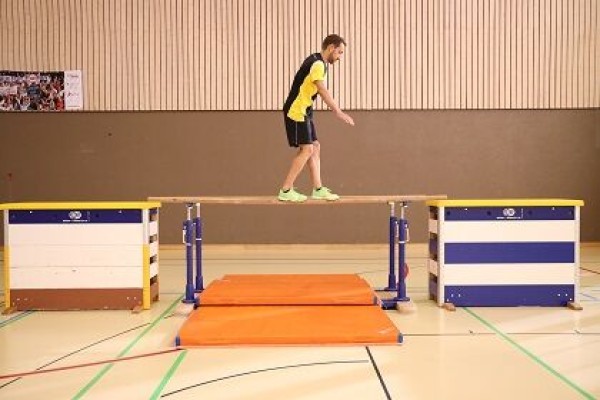
Moving from one vaulting box to the other by crossing the bar on all fours or in an upright position.
1 parallel bars
2 vaulting boxes
2-4 soft mats (small)
Post setup:
Set up two vaulting boxes with a parallel bar in between (lengthwise).
Balancieren
Parkour
Individual work
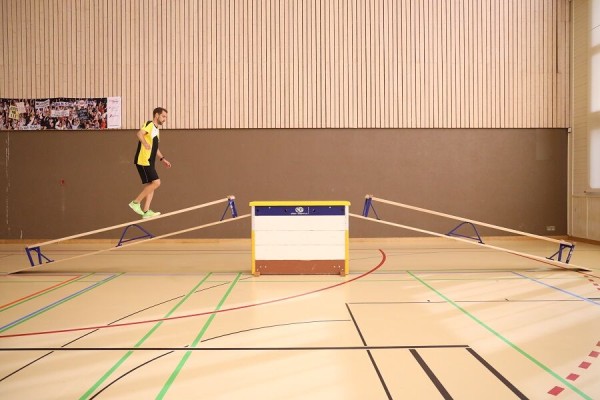
Balancing over the long benches and the vaulting box from one side to the other.
Variations:
Change direction of movement (fw./rw.);
Change type of movement (upright/on all fours);
Change speed.
outdoor:
Walk along a pole or narrow wall in a four-foot stance.
Variant:
Walk backwards.
1 vaulting box ► indoor version
2 long benches ► indoor version
Indoor post setup:
Hook two long benches with the narrow side facing up at both ends of a vaulting box.
outdoor:
Pole or narrow wall.